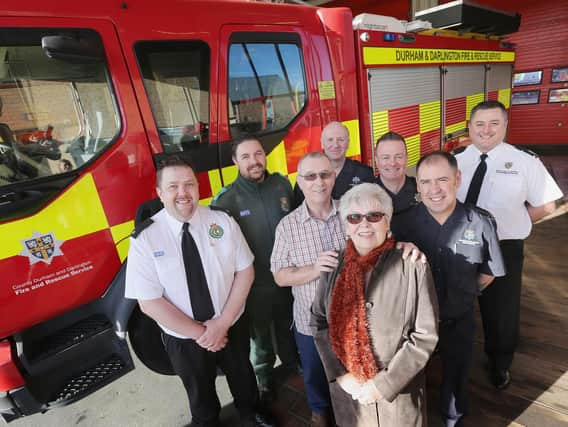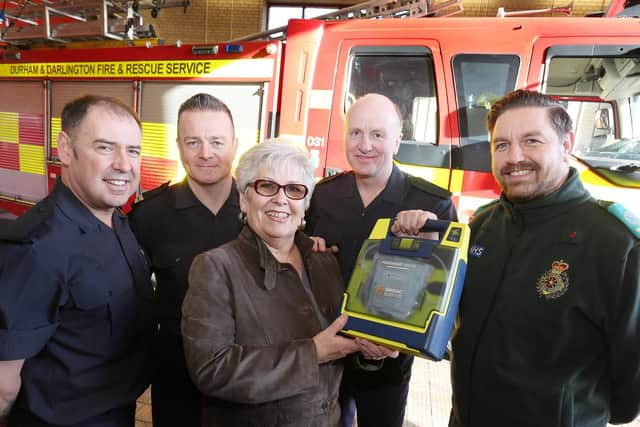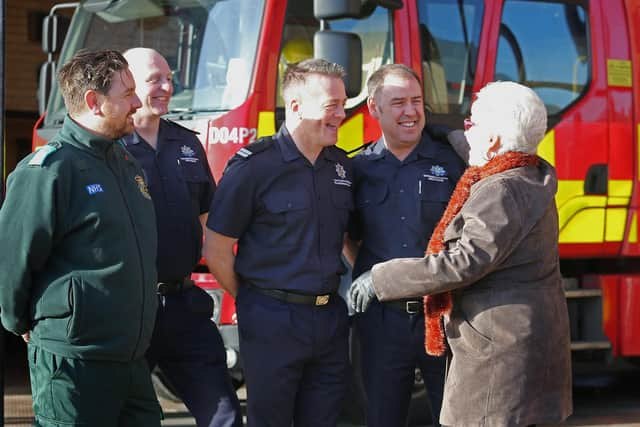Great-gran Linda owes her life to swift action of firefighters after cardiac arrest


Linda Broxson, 68, had just been dropped off by partner John at her weekly Bingo night at Deneside Working Men's Club when she went into cardiac arrest in January.
But instead of an ambulance crew assisting in the immediate aftermath of her collapse, Linda ended up being the first patient to be revived by firefighters.
Advertisement
Hide AdAdvertisement
Hide Ad

Now Linda has been reunited with those who came to her aid as part of an emergency medical responder pilot with North East Ambulance Service (NEAS).
First on scene to help the mother-of-two was crew manager Paul Hodgson and firefighters John Hunter and Steve Bramley from County Durham and Darlington Fire and Rescue Service, just minutes after the 999 call was received by NEAS.
“We knew we were responding to an unconscious patient who had suffered a cardiac arrest and wasn't breathing and were met by a lady on arrival who was surprised to see the fire engine," crew manager Hodgson said.
"I quickly explained that we were emergency co-responders trained to help and that the ambulance was on its way.
Advertisement
Hide AdAdvertisement
Hide Ad

"This was the first job we attended like this and, as you would expect, it was a bit daunting initially, but once we reached Linda our training kicked in.
"My crew did an excellent job clearing Linda’s airway, commencing CPR and attaching a defibrillator before the paramedics arrived. We are so pleased that Linda is recovering well and it’s been a pleasure to meet her in better circumstances.”
The fire service is one of four regional fire and rescue services now responding to medical emergencies as part of a new six-month trial scheme in the North East to work together to save more lives.
Linda's life was saved on day two of the pilot scheme, which commenced on January 11.
Advertisement
Hide AdAdvertisement
Hide Ad

North East Ambulance paramedic Dean Kennedy and emergency care assistant Paul McDonald arrived to the scene just two minutes later to take over and transport Linda to Sunderland Royal Hospital, where she was taken to resus where she was breathing for herself, though she had not regained consciousness.
“I don’t remember everything that happened to me but I do know that they saved my life and I’m a very lucky person," Linda said. " I could never pay them back – they are worth their weight in gold.”
Mr McDonald, who is based at Pallion ambulance station said: “Getting to a person quickly is essential to give them the best chance possible.
"The fire crews are a well-trained and professional service and if they are nearer to an incident than we are, those precious minutes can make all the difference.
Advertisement
Hide AdAdvertisement
Hide Ad

"Linda is a great example of how having the right skills at the right time can support the ambulance service give the best service possible to patients.”
Keith Wanley, head of operations for County Durham and Darlington Fire and Rescue Service, said: “This particular incident occurred on the second day of the sixth month trial and I’m very pleased that our crews were able to help Linda.
"In the three weeks that this trial has been running, the three CDDFRS stations taking part have responded to 260 emergency medical response calls, with as many as 23 on our busiest day; we have also reached two other unconscious non-breathing patients, in separate incidents, in time to revive them using CPR. We are pleased with the way the trial is running; there is good communication between our crews and NEAS paramedics and we will be monitoring the trial throughout the coming months.”
Operations manager at NEAS, Gareth Campbell said, “When someone has a cardiac arrest, every minute without CPR and defibrillation reduces their chances of survival by seven to 10% – so every second counts.
Advertisement
Hide AdAdvertisement
Hide Ad"We receive a new 999 call every 65 seconds and we do our best to reach people as quickly as we can but when someone nearer can begin basic life support like they have for Linda, the outcomes can be positively life changing for patients and their families.”